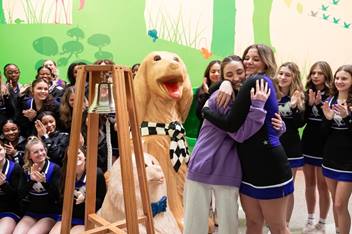Name: Fatima
Condition(s):
- Batten Disease
Specialty(s):
Age at Treatment: Birth
Age Today: 11 Years
Meet Fatima
Where are they now?
Fatima has a neurodegenerative disorder known as CLN2 Batten disease. Children diagnosed with Batten disease begin to rapidly lose their ability to walk, talk, and see as early as 3 or 4 years old. When Fatima was just 3 years old, her parents learned about a clinical trial for enzyme replacement therapy in the brain taking place at Nationwide Children’s Hospital. They partnered with the Make-a-Wish organization to bring their daughter from Oregon to Ohio to participate.
“The goal of this trial is to try to prevent the progression of the disease as we know it,” says Dr. Emily De Los Reyes, director of the Batten Disease Center of Excellence at Nationwide Children’s Hospital, and lead specialist of the Pediatric Neurology Neurodevelopmental Clinic. Fatima has been undergoing this therapy for over a year and has been responding well.
No child wants to be in the hospital during the holidays, so 9-year-old Fatima’s care team works to make her holidays feel normal and memorable. Fatima has a neurodegenerative disorder known as CLN2 Batten disease. “She has a disorder that causes a lack of the enzyme called tripeptidyl peptidase. And if you are lacking that enzyme, you will have accumulation of toxic waste in the brain cells,” explains Dr. Emily De Los Reyes, director of the Nationwide Children’s Batten Disease Center of Excellence at Nationwide Children’s Hospital, and lead specialist of the Pediatric Neurology Neurodevelopmental Clinic.
Children diagnosed with Batten disease begin to rapidly lose their ability to walk, talk and see as early as 4 or 5 years old. When Fatima was just 3 years old, her parents learned about a clinical trial for enzyme replacement therapy in the brain taking place at Nationwide Children’s. They partnered with the Make a Wish organization to bring their daughter from Oregon to Ohio to participate.
“The goal of this trial was to try to prevent the progression of the disease as we know it,” says Dr. De Los Reyes. “This is an enzyme replacement therapy. So, we put a port in their head, and we infuse them every two weeks to be able to replenish the enzymes that she is missing. This therapy allows them to prolong their ability to walk and prolongs the ability to communicate and talk to their families.”
Fatima has since lost her ability to see and needs support while walking but she enjoys playing with toys, listening to music and cartoons and playing with her parents. “We want to make her as happy as we can, we try to be with her as much as we can, make her laugh as much as we can and play together as much as we can,” shares Fatima’s father, Miguel.
Though Fatima is not a participant, Nationwide Children’s has an active clinical trial that is putting enzymes in patients’ eyes to try to improve or prolong their vision. “We are the only hospital in the whole country that can do that,” says Dr. De Los Reyes. “It's very important for me to be able to convey that message of hope to the families and be able to, one day, hope that these children who lose their vision are able to see again.”
This holiday season, give to Light Up the Lawn, Light Up a Life to support Nationwide Children's Hospital’s lifesaving research and support patients like Fatima.



